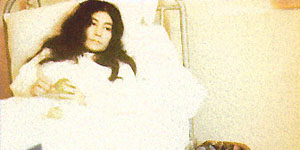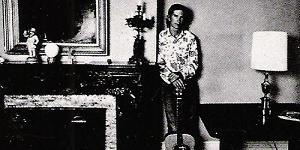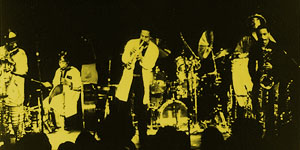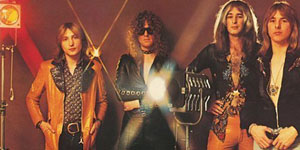The 100 Greatest Songs of the 1970s, Part V.

080. Yoko Ono “Listen, the Snow Is Falling”
(Yoko Ono)
b-side, 1971
Yes, another Yoko solo song. As long as people continue to repeat the canard about Yoko being the evil bitch who broke up the Beatles, I’ll continue to celebrate her real and considerable achievements on her own. Not that this is really on-her-own on her own; John’s fingerprints are all over this thing, from the gorgeous church-organ arrangement to the simple beauty of the melody and the vivid poetry of the lyrics. It was the b-side to “Happy Christmas (War Is Over),” and thirty-five years later is so much obviously the superior song that it’s kind of insulting to know that the a-side will be all over oldies stations in the next month whereas I’m only ever going to be able to hear this by pressing Play. The fact that Galaxie 500 brought the song to indie-snob attention in 1990 with their final album is a factor, but only in the sense that they pointed out how far ahead of her time Yoko (and John) could be: nothing else released in the 1970s is quite as relevant to modern indie-pop as this. Belle & Sebastian, among thousands of others, are somehow unimaginable without it. Two last things to savor: the false beginning where it sounds like it’s going to just be more whisper-pop, and the stately, chiming hook that sounds both like Bach and Phil Spector at his best.
079. Townes Van Zandt “Pancho and Lefty”
(Townes Van Zandt)
The Late Great Townes Van Zandt, 1972
And sometimes all you need is a man and a guitar and some dust in his voice. Townes Van Zandt (no relation to Steve or the Skynyrd boys) was one of the all-time great singer-songwriters, a Texan whose downbeat version of country-inflected folk-rock brings to mind a Southern, rural Leonard Cohen. The song is a character sketch of sorts, an incomplete story in which the important things are left unsaid and the imagery is all passive: a determinedly pessimistic response to the failure of 60s idealism. The chorus is one of the great sarcastic barbs of the 70s (a decade, let it be noted, in which Randy Newman and Warren Zevon came into their own), a weary sneer at human folly and the general pointlessness of it all. But it’s the sound of the song, more than anything, that really gets me: I live in the American Southwest, and I tend to spend most of my music hours immersed in the sound of just about anywhere else, but this is the sound of scrub brush on the vast yellow-gray plains, a two-lane ribbon of road heading from nowhere to nowhere, under a vast uncaring sky. It’s the sound of weathered boards and metal that’s oxidized for decades in the desert heat, the sound of grainy, unlovely dust getting everywhere, no matter how tightly you shut everything up. Pancho and Lefty knew this terrain well, and while one of them died in Mexico and the other tried to escape to the more shuttered Midwest, you never really get the mesas out of the back of your mind.
078. The Art Ensemble of Chicago with Fontella Bass “Theme de Yo-Yo”
(The Art Ensemble of Chicago)
Les Stances a Sophie, 1970
The Art Ensemble of Chicago: the legendary conceptual-jazz quartet who built off of Coltrane, Davis and Shepp to blaze a cosmic, performance-art-oriented path across the musical landscape. Fontella Bass: the St. Louis soul singer whose big hit was “Rescue Me.” Oh, and who also happened to be married to AEC trumpeter Lester Bowie. Les Stances a Sophie: a mediocre French dramedy which managed to snag one of the most innovative jazz groups around to record the soundtrack, because they were living in Paris at the time. “Theme de Yo-Yo”: the most perfect union of jazz and funk on record. Fontella sings some surreal lyrics featuring some of the least complimentary similes outside of a Dylan song (though it’s hard to tell whether or not they’re meant to be uncomplimentary; some people think they’re sexy), the drummer and bassist lock into a groove and keep it going come hell or high water; and the horns head for the stars. Then, suddenly, wham! that nagging, funky riff returns, and you realize that you’ve been dancing through some of the freakiest free-jazz squalls this side of Ornette Coleman. This keeps up for another five minutes of funky, freaky goodness, Fontella returns for a victory lap, and it’s still a tragically well-kept secret outside of hardcore funk and jazz heads. But I guarantee you that Can knew it well.
077. Mott the Hoople “Honaloochie Boogie”
(Ian Hunter)
Mott, 1973
Mott the Hoople is a difficult band to rank in a list like this. This is because while they weren’t a spectacularly original or innovative band, they were always really good (at least till Hunter left), and so I’m left with the difficulty of deciding which of their many terrific songs is my favorite. I’m not going to complain, because it means I get to listen to more Hoople, but all that is just to say that “Honaloochie Boogie” was chosen almost at random. What gave it the edge is that I wanted to point out how funny the way the British pronounce “boogie” (with a long “oo” instead of a short one, like the Americans who freaking invented the stuff) always is to me. At least they get the hard G right. And okay, the riff is really great; they were only really associated with glam rock for the one album that Bowie produced, but the pep talk it provided made for some wonderful crystalline production, all glitter and kick. The reluctant sound of Mick Ralphs’ guitar (I don’t know how else to describe it) is one of my favorite sounds from the 70s; for a band that started out almost pathetically influenced by the Stones, they were nearly on another planet by this time. Oh, and Hunter’s watery production on the “she’s a screwdriver jiver” bridge deserves a nod. So does the guest appearance of Andy Mackay’s saxophone. Shit, this is an even better song than I thought!
076. Kirsty MacColl “They Don’t Know”
(Kirsty MacColl)
single, 1979
Stiff Records is in the running for greatest label of all time. Not just because of their impudent bravado, which turned the art of promotion on its head, and not even because of the leg up they gave to punk and/or Elvis Costello, but because they nearly single-handedly revived the art of the great pop single at the tail end of the 70s. Almost forgotten beneath weighty double-album prog rock epics, unlimited disco remixes, the macho posturing of heavy metal, and insidiously bland corporate “rock” that sounded like nothing so much as cocaine poured over folk-rock’s twitching corpse, the great pop single (you know, like the Turtles, the Monkees, the Beach Boys, and those other guys, what was their name, oh yeah the Beatles used to make) was forgotten, consigned to the dustbin of slightly disreputable history. Until a scrappy label with practically no taste and unlimited enthusiasm (plus perhaps the greatest in-house producer ever, Nick Lowe) popped up in a Bayswater back street and decided that they would do whatever the hell they pleased. One of the things that pleased them to do was to record Kirsty MacColl, a.k.a. The Greatest Pop Singer of The Last Twenty-Five Years. They were interested in her songs mostly for Tracy Ullman to cover (no, really), but one listen to this Phil-Spector-for-the-blank-generation song (and that heartstopping “ba-ay-bee!”) drops a major hint as to just who the one with the talent really was.
Next: 075-071. >>

No comments:
Post a Comment